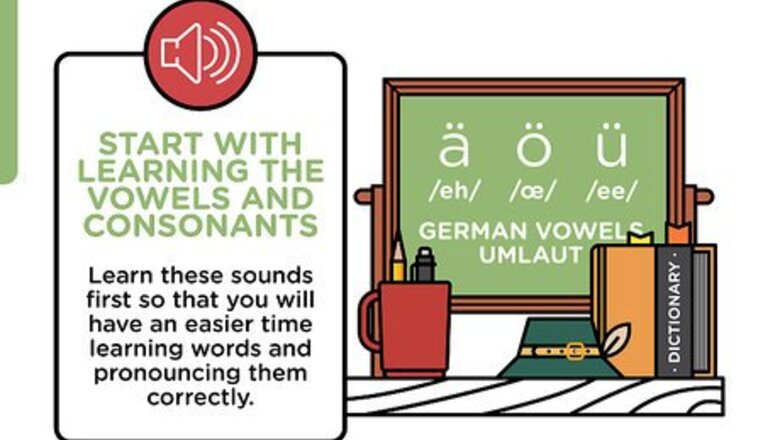
views
X
Research source
German and English are closely related and with a little effort and time you can learn German too! Read below for some helpful guidelines to learning the language.
Pronunciation
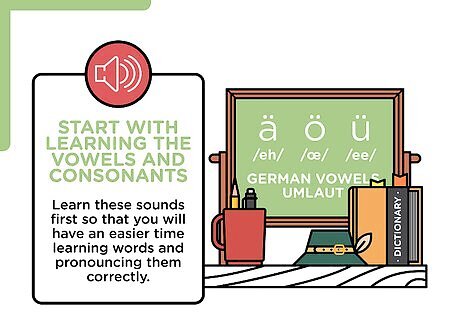
Start with learning the vowels and consonants. The vowels and consonants sound different in German than they do in English. Learn these sounds first so that you will have an easier time learning words and pronouncing them correctly. Pay attention to how vowels sound alone, versus how they sound when they are used in conjunction. Much like English, two vowels together sound very different than either of them alone. Similarly, the consonants can sound very different when used in certainly places in a word or when used in conjunction. Learn these variations so that you can pronounce words correctly. Don't forget that German has a few extra letters that are not present in English. ( Ä Ö Ü ß ) You will need to learn these, as well as how they're pronounced, if you want to understand and be understood.
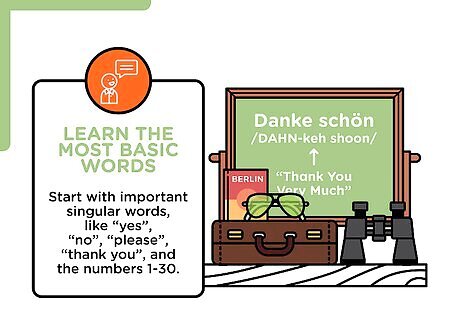
Learn the most basic words. Learn the most basic words so that you have a starting framework in which to place the nouns, verbs, and adjectives you will learn later. It is also important to learn some basic words before traveling to Germany or trying to talk to any Germans. Start with important singular words, like “yes”, “no”, “please”, “thank you”, and the numbers 1-30. Move on to basics like “I am” (Ich bin), “You are” (Du bist), “He/She is” (Er/Sie ist), etc.

Learn basic sentence construction. Get a basic idea of how sentences are constructed. This will not be too difficult, as German is very similar to English in this way. There are slight variances but you can learn some now and will learn the more complex ones with time. Germans will generally be able to understand what you are trying to say, even if you get the word order wrong. Pronunciation goes much further towards being understood, so worry about that much more in the beginning.
Vocabulary
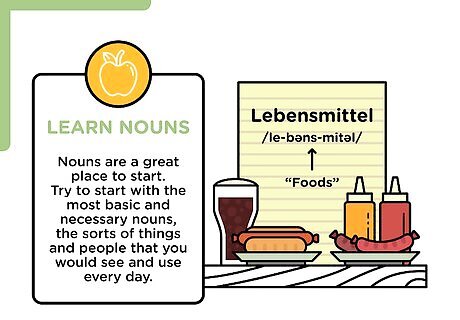
Learn nouns. Once you have a basic framework with which to learn and use the language, you will want to start learning words. Nouns are a great place to start. Try to start with the most basic and necessary nouns, the sorts of things and people that you would see and use every day. Nouns are subject to a case system, gendering, and will also change based on how many of that thing there are. Learn how all of these things affect nouns while you are increasing your vocabulary. Examples of good nouns to start with include food words, the objects you find around the house, important places around town, and important people you may need to talk to or find (such as a doctor, police officer, etc.).
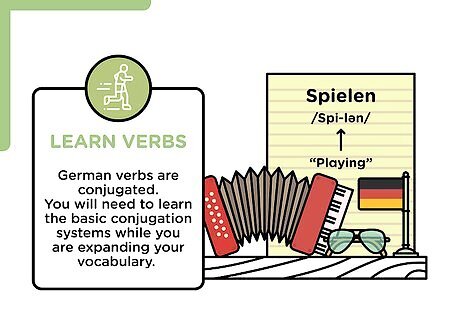
Learn verbs. You will also want to learn key verbs. This will give all those nouns you just learned something to do! German verbs are conjugated. You will need to learn the basic conjugation systems while you are expanding your vocabulary. Learn the most basic verbs before you learn complex ones. To run, to walk, to jump, to stop, to fall, to be, to have, to say, to do, to get, etc. These will be the most useful in the beginning and are easier to say and learn than more complex words.
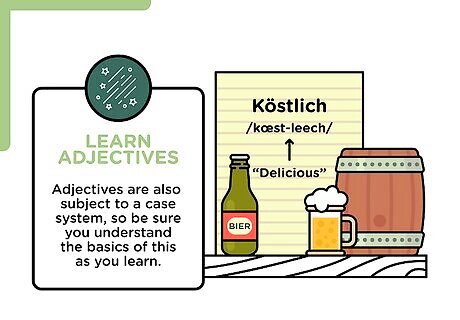
Learn adjectives. Once you have some nouns and verbs down, you will also want to learn some adjectives, so that you can make your sentences more complex. Adjectives are also subject to a case system, so be sure you understand the basics of this as you learn.
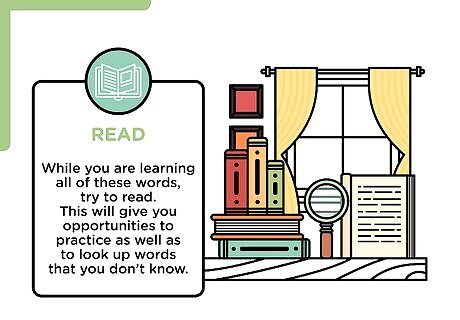
Read. While you are learning all of these words, try to read. This will give you opportunities to practice as well as to look up words that you don’t know. Read very basic books, such as children’s books or comics, since these will be easier for you to follow so early on.
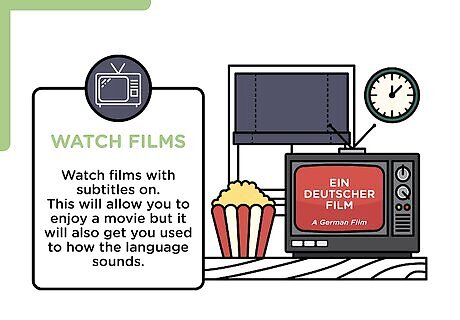
Watch films. Watch films with subtitles on. This will allow you to enjoy a movie but it will also get you used to how the language sounds. As you are watching the film, you can repeat words and phrases after the actors. This is also a good way to learn some basic vocabulary. Try to pay attention to how the translation correlated with what they are saying on screen. You can also watch the German version of a movie or a series you already know well.
Fluency
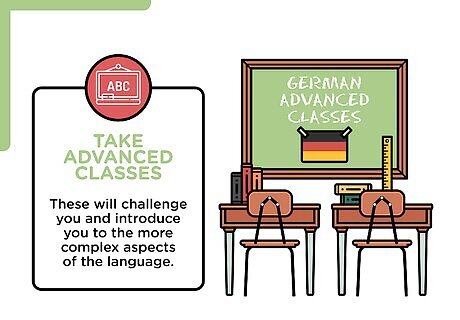
Take advanced classes. As your knowledge advances, you will want to take classes that correspond to the level that you are at. These will challenge you and introduce you to the more complex aspects of the language. Advanced courses are available through your local colleges and universities, but it is also possible to take online courses from reputable sources, such as the Goethe Institute or Lingoda.

Try to study in Germany. The German state strongly encourages cultural exchange and you will find that there are a number of opportunities to study there. Living in Germany will increase your language abilities better than anything else, as this will immerse you in the language and you will get to see how it is used first-hand. You can go to Germany through an exchange arranged by your high school or university, or you can apply to a university or community college in Germany. Student visas will be granted to allow you to stay in the country and tuition is much less expensive than in many other places. You may also be able to get a job and work, rather than going to school. If you are young enough, it is even possible to work as an au pair (or nanny). English-speaking nannies are coveted in Germany.

Make a German friend. Making a German friend will give you the opportunity to practice your German, get advice on pronunciation and grammar, learn new words, as well as getting to know the culture. You can chat with them online, make calls over Skype, or you can try to find a local German (such as a student at your university).
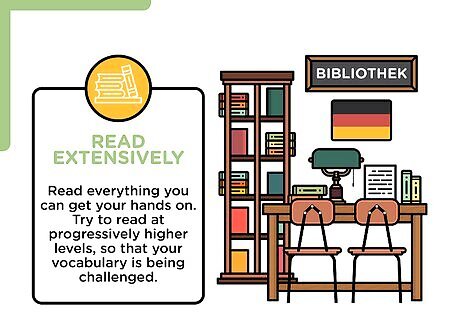
Read extensively. Read everything you can get your hands on. Try to read at progressively higher levels, so that your vocabulary is being challenged. You can read from any source, but try to read sources that are likely to have good use of grammar and spelling. This will help you to learn the language correctly. You can read online copies of German newspapers and magazines. Examples include Die Zeit, Frankfurter Rundschau, or Der Spiegel (which tends to be of a slightly lower reading level than the newspapers).

Watch films without subtitles. This will challenge you to understand the language without the crutch of relying on the translation. You may not understand words all of the time but as time goes on you will learn more and more. This can be a great way to build uncommon vocabulary, as you will get to hear the kind of language that doesn’t come up in everyday conversation.
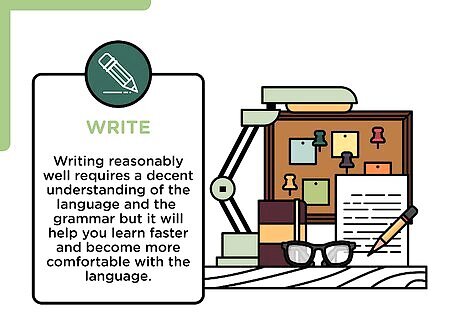
Write. It doesn’t really matter what you write, just write. Writing reasonably well requires a decent understanding of the language and the grammar but it will help you learn faster and become more comfortable with the language. If at all possible, find a native German to read whatever it is you are writing and give you feedback. You can write letters, a journal, movie reviews, or anything else you can think of.




















Comments
0 comment